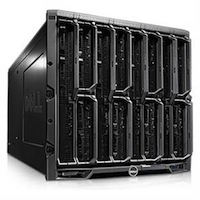Study shows most businesses missing out on virtualization benefits
 Editor's note: This article was commissioned by Dell. To learn more about Dell's solutions for improving responsiveness while reducing costs with virtualization, please visit Dell's site by clicking here.
Editor's note: This article was commissioned by Dell. To learn more about Dell's solutions for improving responsiveness while reducing costs with virtualization, please visit Dell's site by clicking here.
Virtualization as a concept has become one of the most important technologies to come about in the modern PC era. The benefits are many: IT administrators love virtualization because it cuts down on administration and data center size and the bookkeepers approve of it as it cuts down on IT costs. Many businesses aren't taking advantage of its full benefits, however.
A recent study by IDG Research of Computerworld readers who oversee IT deployments found that 87 percent of them are using some type of virtualization. Thirty percent have virtualized more than half of their deployments. Of those using virtualization, 55 percent have seen an operational efficiency gain, while 53 percent have seen power and cooling costs drop.
Even with a considerable amount of those using virtualization, many are just scratching the surface when it comes to the benefits of the technology. Eighty five percent say virtualization was intended to consolidate their server farms, while 72 percent are using virtualization to support application development.
This is only the tip of the iceberg as to what virtualization can do. Companies could be using the technology to speed rollouts of their business solutions, or using the technology to dynamically change their processing and storage capacity based on needs. There's a hangup somewhere.
For 31 percent of respondents it was security, while 30 percent complained some aspects of virtualization were just too complex. Another 26 percent said that the management tools that they were using were simply inadequate. That's where the latest virtualization solutions from Dell using Intel technology come in.
When it comes to security, Intel's Xeon 5000 series processors have Intel Trusted Execution Technology built in. What this does is isolate applications, and in turn prevents them from being susceptible to software and system-level attacks. Dell also includes a chip in its newest servers known as a Trusted Platform Module, which encrypts sensitive data such as keys and certificates in "tamper proof" files.
Complexity is reduced through standardization, Dell says. The company offers a program called Dell Business-Ready Configurations to make deployment easy and painless. These packages offer the hardware, software and support customized to the needs of the particular business. The result is a business that uses virtualization more effectively.
Dell has also gone to great lengths to offer its customers powerful management tools, such as the Lifecycle Controller found on its newest PowerEdge servers. Lifecycle Controller centralizes all the management functions to a single place, making tasks such as installing, deploying, and updating software across IT deployments very simple.
In addition, the Dell Management console will allow IT administrators to easily view their entire IT infrastructure, making management tasks such as discovery, inventory, monitoring, and updating easy; and Dell OpenManage Server Administrator, a free tool which allows administrators to easily diagnose and repair issues related to system configuration, health, and performance.
Either way, it does seem like many businesses are missing out on the true benefits of virtualization. In order to fix that, a comprehensive solution is necessary, and it appears that Dell and Intel have come up with a compelling solution that allays many of the concerns that IT administrators may have in letting virtualization play a bigger role in their deployments.

Pingback: Study shows most businesses missing out on virtualization benefits | Web Hosting Geeks - Shared Web Hosting, VPS, Dedicated Servers, Virtualization and Cloud Computing